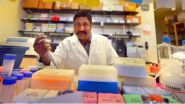(Press-News.org) The first randomised trial to compare treatments for ectopic pregnancies has found no significant differences in subsequent fertility between medical treatment and conservative surgery on one hand, and conservative or radical surgery on the other.
The study, which is published online today (Wednesday) in Europe's leading reproductive medicine journal Human Reproduction [1], compared three ways of treating an ectopic pregnancy: medically by methotrexate injection to interrupt pregnancy in the Fallopian tube; conservative surgery, which preserves the Fallopian tube (known as salpingostomy); and radical surgery, which removes the Fallopian tube (known as salpingectomy).
The French researchers found that there was no significant difference in fertility two years later between medical treatment and conservative surgery for ectopic pregnancies that were suitable for being treated this way, or between conservative and radical surgery for ectopic pregnancies that required surgical intervention. (They did not compare subsequent fertility rates between medical treatment and radical surgery, as some women would definitely have to be treated by surgery).
Between 2005-2009, researchers from 17 centres in France who were part of the "Groupe de recherche en gynécologie et obstétrique" (research group in gynaecology and obstetrics) randomised a total of 406 women to one of two arms: 1) those with less active ectopic pregnancies, judged by factors such as risk of the fallopian tube rupturing, how long it has been since the last menstruation, hormone levels, fluid in the peritoneal cavity, and who lived close enough to the hospital; and 2) those with more active ectopic pregnancies, where medical treatment is considered impracticable due to factors such as the fallopian tube rupturing or likely to rupture, and greater risk as indicated by the factors considered in the first arm of the study.
A total of 207 women in the first arm were randomised to either medical treatment or conservative surgery, while 199 were randomised to conservative or radical surgery in the second arm.
After two years the rates of spontaneous pregnancies in the uterus (intrauterine pregnancy) were 67% after medical treatment and 71% after conservative surgery in the first arm. The rates in the second arm were 70% after conservative surgery and 64% after radical surgery. The differences between the rates in each arm of the trial were not statistically significant. [2]
Dr Perrine Capmas, a gynaecology surgeon and obstetrician at the Service de Gynécologie et Obstétrique, Hôpital Bicêtre, University Paris Sud, Paris, France, [3] said: "This is the first randomised study to be able to compare fertility after the three treatments for ectopic pregnancies. We found that two years after treatment, there was no significant difference in fertility among the women who received medical treatment or conservative surgery in the first arm of the study, or women who received conservative or radical surgery in the second arm."
In their paper Dr Capmas and her co-authors write: "Our results suggest the following clinical recommendations for management:
In less active EP [ectopic pregnancy], others parameters such as indication of each treatment and their own therapeutic effectiveness had to be taken into account. Medical treatment should be preferred in less-active ectopic pregnancies when possible, to take into account women's preferences … and also because it entails fewer anaesthesia- and surgery-related risks. However, given the absence of any difference for subsequent fertility, surgical treatment should be preferred for women whose compliance with immediate follow-up may be doubtful.
Once surgery is necessary, in more active ectopic pregnancies, the non-significant (and quantitatively small) difference in subsequent fertility should lead to a reconsideration of the balance between considerations of initial recovery and those of fertility preservation. Physicians should appropriately inform women on these two points."
Dr Capmas added: "This means that we are able to give better advice to women when they are being treated for an ectopic pregnancy. If a woman has an active ectopic pregnancy for which surgery is the only treatment possible, then we can tell them that even if we try conservative surgery first, there is a risk they will need more radical surgery. However, we can tell them that subsequent fertility seems to be similar after each treatment.
"For less active ectopic pregnancies, we can inform women about the two available treatments (medical and conservative surgery). We can give information about operative risk, healing time, risk of the need for subsequent surgery if medical treatment is chosen first, and the fact there is similar subsequent fertility.
"We can also inform them that regardless of treatment, risk factors for ectopic pregnancies need to be corrected if possible, in order to enhance fertility and decrease recurrence rates, for example, by stopping tobacco consumption."
She concluded: "We hope that the results of this trial, called DEMETER after the Greek goddess of fertility, will lead to clinicians thinking carefully about the management of ectopic pregnancies, success rates, operative risks, healing time, subsequent fertility, economic aspects and, importantly, women's preferences." [4]
### [1] "Fertility after ectopic pregnancy: the DEMETER randomized trial", by Hervé Fernandez, Perrine Capmas, Jean Philippe Lucot, Benoit Resch, Pierre Panel, and Jean Bouyer, for the GROG. Human Reproduction journal. doi:10.1093/humrep/det037
[2] These rates compare with published pregnancy rates in the general population after an ectopic pregnancy of 76% after medical treatment, 76% after conservative surgery and 67% after radical surgery. Normal pregnancy rates in the general population among women who have not had an ectopic pregnancy are around 84-89%.
[3] Dr Capmas also works at the Epidemiology of Reproduction and Child Development Team, Inserm, CESP Centre for Research in Epidemiology and Population Health (Paris, France).
[4] There are few data available on current treatment practices for ectopic pregnancies. In France there appear to be large differences, with medical treatment accounting for an average of about 50%, conservative surgery 30% and radical surgery 20%, depending on the gynaecological team involved.
Fertility after ectopic pregnancy: Study finds reassuring evidence on different treatments
First randomized trial of different treatment for ectopic pregnancy
2013-03-13
ELSE PRESS RELEASES FROM THIS DATE:
Researchers find link between low cognitive score and risk of brain injury
2013-03-13
It is estimated that there are 10 million cases of traumatic brain injury globally every year with mild traumatic brain injuries being responsible for 70-90% of these. Incidence is highest among young males.
Current literature suggests that mild traumatic brain injuries cause changes in brain tissues and have important long-term consequences on cognitive function. Deficits have been described in attention, memory, verbal learning and processing speed and may occur in 15-25% of those suffering one of these injuries.
However, little is known about population-wide cognitive ...
When hungry, Gulf of Mexico algae go toxic
2013-03-13
When Gulf of Mexico algae don't get enough nutrients, they focus their remaining energy on becoming more and more poisonous to ensure their survival, according to a new study by scientists from North Carolina State University and the National Oceanic and Atmospheric Administration.
The study shows that harmful and ubiquitous Karenia brevis algae, which cause red tide blooms across the Gulf of Mexico, become two to seven times more toxic when levels of phosphorus, a major algal nutrient found in fertilizers and human waste, are low. Like wearing a suit of armor, producing ...
Marine diversity study proves value of citizen science
2013-03-13
Citizen science surveys compare well with traditional scientific methods when it comes to monitoring species biodiversity – according to new research from the University of East Anglia.
Research published today in the journal Methods in Ecology and Evolution shows that methods to record marine diversity used by amateurs returned results consistent with techniques favoured by peer-reviewed science.
The findings give weight to the growing phenomenon of citizen science, which sees data crowd-sourced from an army of avid twitchers, divers, walkers and other wildlife enthusiasts. ...
'I don't want to pick!' Preschoolers know when they aren't sure
2013-03-13
Children as young as 3 years old know when they are not sure about a decision, and can use that uncertainty to guide decision making, according to new research from the Center for Mind and Brain at the University of California, Davis.
"There is behavioral evidence that they can do this, but the literature has assumed that until late preschool, children cannot introspect and make a decision based on that introspection," said Simona Ghetti, professor of psychology at UC Davis and co-author of the study with graduate student Kristen Lyons, now an assistant professor at Metropolitan ...
Promising new drug treats and protects against radiotherapy-associated oral mucositis
2013-03-13
Mouse model studies show that administered genetically or topically, protein Smad7 protects against or heals mouth sores commonly associated with cancer treatment.
In some cancer patients treated with radiation, the mouth sores known as oral mucositis become so severe that feeding tubes are required for nutrition and narcotics are needed for pain. In fact, 40-70 percent of patients treated with upper-body radiation develop the condition to some degree. Currently, there is no FDA approved treatment. A University of Colorado Cancer Center study published this week in the ...
Political strife undermines HIV treatment
2013-03-13
PROVIDENCE, R.I. [Brown University] — As Kenyan citizens negotiated the tensions following the March 4 nationwide elections, memories of the violence that followed the December 2007 vote weighed heavily for many reasons. Among those in any nation with an HIV epidemic, argue authors of a new paper in AIDS Reviews, should be the long-term damage that political conflict can do to public health by disrupting treatment and thereby promoting resistance to antiretroviral drugs and treatment failure.
"It's the long-term consequences that make this a bigger issue," said lead author ...
Potential early indicator of kidney injury identified
2013-03-13
AUGUSTA, Ga. – A guidance cue that helps kidneys form may also be a red flag that they are in danger, researchers report.
Acute kidney injury, a common and serious complication of hospitalization, is on the increase worldwide, affecting an estimated 6 percent of all hospitalized patients and 30-40 percent of adults and children having cardiopulmonary bypass surgery.
About 10-15 percent of acute injuries translate to chronic kidney damage or failure that may require dialysis or a kidney transplant, said Dr. Ganesan Ramesh, kidney pathologist in the Vascular Biology ...
A European invader outcompetes Canadian plants even outside its usual temperature range
2013-03-13
Dog-strangling vine (Vincetoxicum rossicum) is an exotic plant originating from the Ukraine and southeastern Russia that is becoming increasingly invasive in southern Ontario, Canada. It has been found growing successfully in both disturbed and undisturbed areas, in open fields, forest edges and understories, parks, road edges and railway embankments. The invasive plant effectively competes for light by forming large and dense stands that climb over other plants. A study published in the open access, peer-reviewed journal NeoBiota explores the effects of V. rossicum invasion ...
The natural ecosystems in the Colombian Orinoco Basin are in danger
2013-03-13
The Orinoco River flows from the Andes in Colombia to the Atlantic in Venezuela. The area of the basin includes landscapes of the Andes, plains of the Llanos and the Guiana shield. Orinoco's tributary rivers form a basin considered to be the 3rd most important river system on the planet, and one of the most biologically diverse areas of the world.
Colombia has shown a strong commitment to the achievement of the Convention on Biological Diversity's 2010 biodiversity target, by promoting the conservation of at least 10% of its natural ecosystems. Protected Area categories ...
Astronomers observe planets around another star like never before
2013-03-13
PASADENA, Calif.—Thanks to a new high-tech gadget, astronomers have observed four planets orbiting a star relatively close to the sun in unprecedented detail, revealing the roughly ten-Jupiter-mass planets to be among the most exotic ones known.
The team, which includes several researchers from the California Institute of Technology (Caltech), describes its findings in a paper accepted for publication by the Astrophysical Journal.
The findings were made possible by a first-of-its-kind telescope imaging system that allowed the astronomers to pick out the planets amidst ...
LAST 30 PRESS RELEASES:
Research alert: Understanding substance use across the full spectrum of sexual identity
Pekingese, Shih Tzu and Staffordshire Bull Terrier among twelve dog breeds at risk of serious breathing condition
Selected dog breeds with most breathing trouble identified in new study
Interplay of class and gender may influence social judgments differently between cultures
Pollen counts can be predicted by machine learning models using meteorological data with more than 80% accuracy even a week ahead, for both grass and birch tree pollen, which could be key in effective
Rewriting our understanding of early hominin dispersal to Eurasia
Rising simultaneous wildfire risk compromises international firefighting efforts
Honey bee "dance floors" can be accurately located with a new method, mapping where in the hive forager bees perform waggle dances to signal the location of pollen and nectar for their nestmates
Exercise and nutritional drinks can reduce the need for care in dementia
Michelson Medical Research Foundation awards $750,000 to rising immunology leaders
SfN announces Early Career Policy Ambassadors Class of 2026
Spiritual practices strongly associated with reduced risk for hazardous alcohol and drug use
Novel vaccine protects against C. diff disease and recurrence
An “electrical” circadian clock balances growth between shoots and roots
Largest study of rare skin cancer in Mexican patients shows its more complex than previously thought
Colonists dredged away Sydney’s natural oyster reefs. Now science knows how best to restore them.
Joint and independent associations of gestational diabetes and depression with childhood obesity
Spirituality and harmful or hazardous alcohol and other drug use
New plastic material could solve energy storage challenge, researchers report
Mapping protein production in brain cells yields new insights for brain disease
Exposing a hidden anchor for HIV replication
Can Europe be climate-neutral by 2050? New monitor tracks the pace of the energy transition
Major heart attack study reveals ‘survival paradox’: Frail men at higher risk of death than women despite better treatment
Medicare patients get different stroke care depending on plan, analysis reveals
Polyploidy-induced senescence may drive aging, tissue repair, and cancer risk
Study shows that treating patients with lifestyle medicine may help reduce clinician burnout
Experimental and numerical framework for acoustic streaming prediction in mid-air phased arrays
Ancestral motif enables broad DNA binding by NIN, a master regulator of rhizobial symbiosis
Macrophage immune cells need constant reminders to retain memories of prior infections
Ultra-endurance running may accelerate aging and breakdown of red blood cells
[Press-News.org] Fertility after ectopic pregnancy: Study finds reassuring evidence on different treatmentsFirst randomized trial of different treatment for ectopic pregnancy





